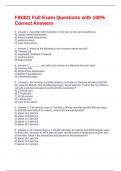Exam (elaborations)
FIN301 Full Exam Questions with 100% Correct Answers
- Course
- Institution
b - Answer-1. Securities with maturities of one year or less are classified as A) capital market instruments. B) money market instruments. C) preferred stock. D) none of the above c - Answer-2. Which of the following is not a money market security? A) Treasury bill B) negotiable certificat...
[Show more]



